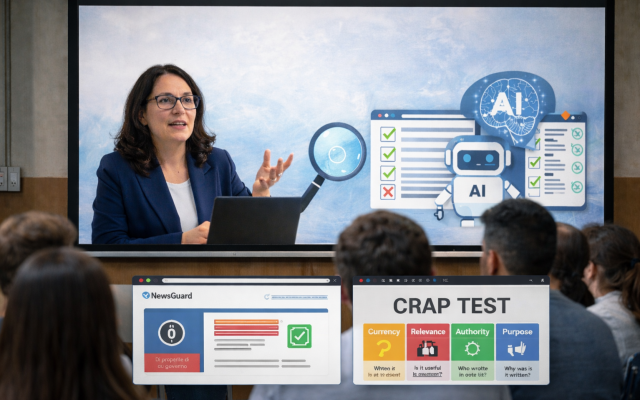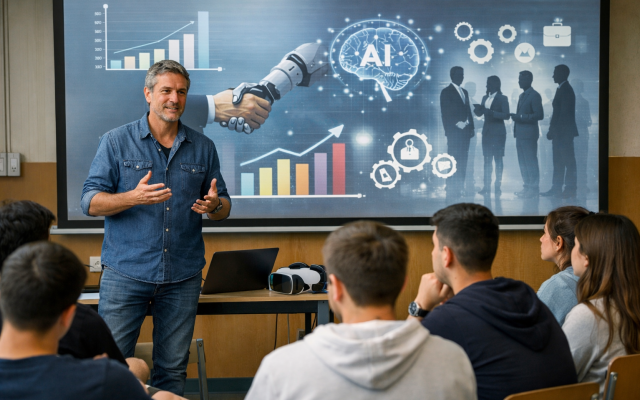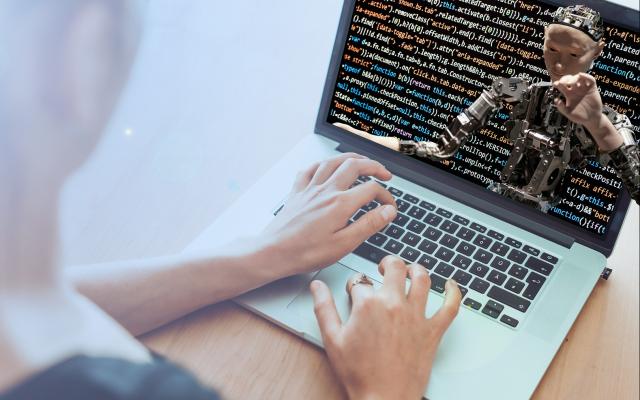Ital.IA Lab: the experience at the Istituto superiore Primo Levi in Bollate
Education is constantly evolving and changing. And the Liceo Primo Levi in Bollate (Milan), directed by Elisabetta Boselli, is in a cutting-edge position thanks to Project Ital.IA Lab. Here is what Prof. Pietro Confalonieri, digital coordinator at the school, has to say.
How has Project Ital.IA Lab enriched your school's educational catalogue?
“Project Ital.IA provided us with an opportunity to address generative artificial intelligence, both from a practical and theoretical point of view, especially in terms of the ethics involved in using these new tools. The experience also allowed our school to renovate its laboratories with new hardware.”
How did the school community react to the introduction of AI?
“AI is an innovation that we just cannot ignore. The first thing to understand is how to integrate it effectively into teaching. This will help us overcome prejudice and achieve our goals as educators: training children in the use of AI, which they will not be able to do without from a professional point of view.”
Are there any plans to expand the use of AI at the school?
“It's a critical technology and there will definitely be further learning opportunities next year. An excellent relationship was immediately established with Coach Monica, who is an exquisite and very helpful person. What I would really like is to bring AI into prisons, too. In fact, I also teach at the Bollate prison, and I think it would be interesting to understand how these new technologies can influence the rehabilitation of inmates.”
Bollate’s story was enriched by Monica Umberta Oriani, the FMD Coach who with nearly 25 years of experience as a programmer has faced the challenges of teaching AI with an approach stimulating active participation.
What were the biggest challenges in teaching AI to students and teachers? And the best outcomes?
“The subject is very heartfelt and there was great participation, both from teachers and students. Perhaps, the teachers also have a widespread concern. Many are interested in the topic in an attempt to understand how to stem the incorrect use of generative artificial intelligence tools. However, many also grasp its potential for integration into teaching. Amongst young people, however, the concern of being replaced by this new technology is more widespread. They fear that their skills will become irrelevant in the long run.”
What was the most significant feedback you received from participants?
“I involved the students in a game, a sort of ethical quiz. Their answers revealed different opinions based on considerations of personal freedom and security, with an interesting tendency between genders to perceive the trade-off between privacy and protection differently.”
Could you give us an example?
“I asked them to imagine being in the following situation: the police want to use AI as a surveillance tool, so they can predict crimes before they happen. The question was: would you accept this type of constant monitoring? It was interesting to see how most of the positive answers came from the young men. The young women, on the other hand, who tend to be more exposed to risks and dangers, expressed a largely negative opinion, stating that they were not willing to sacrifice their freedom in the name of greater 'safety'.”
Here is the story of Ivan, a sixteen-year-old student, who shared his personal experience, highlighting the significance of the issues raised by Monica.
“I really liked the sessions with Monica. We didn't expect them to be so focused on ethical aspects, but I must say that this aspect involved us more than the rest. It drove us to reflect on aspects that we may perhaps have taken for granted. In general, in fact, I, as well as my peers, are in favour of the development of this technology. However, we now also know that for this technology to be safe, it must respect of our fundamental rights. Guidelines are necessary.”
What do you think is the biggest danger with the development of AI?
“That it could be used by a minority, providing exclusive knowledge to an elite.”
And what’s the best thing that could happen thanks to AI?
“Inequalities could be overcome, or at least reduced, and access to education promoted for those categories that we generally define as being at a disadvantage.”
Thanks to these opinions, Project Ital.IA Lab emerges as a mosaic of experiences and reflections, a living laboratory where AI becomes a tool for learning, an ethical debate and vision for the future. It is a journey that begins in the classrooms of Bollate and projects farther, towards horizons that have yet to be explored.




